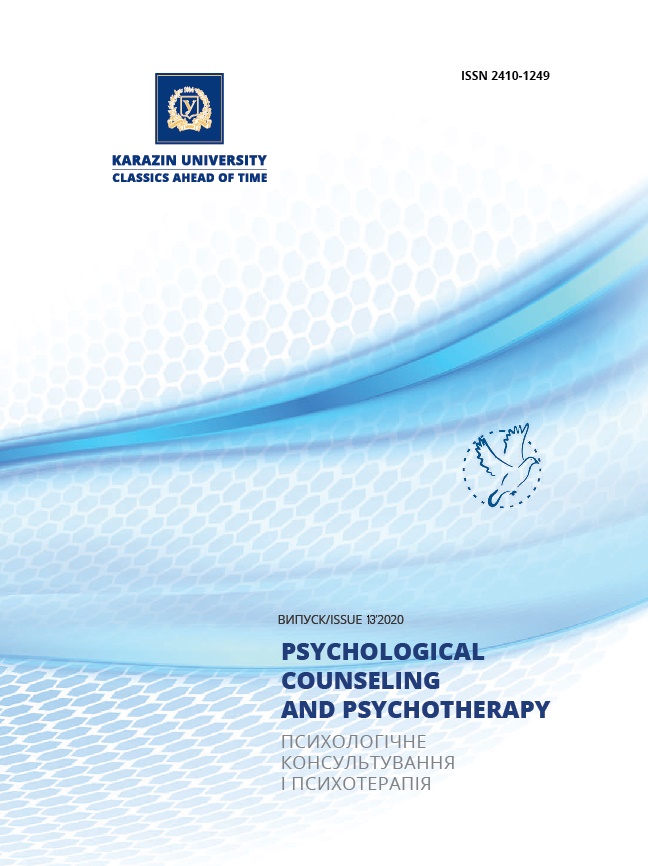Adaptive potential of patients with mental disorders
Abstract
The work is devoted to studying the peculiarities of personal adaptive potential in mental disorders of different genesis. The analysis of the structure of adaptation potential, hierarchy of its elements, qualitative diversity of its internal and external relations can reflect the dynamics of adaptation process prognosis, be an effective component of psychological support programs in forming adaptive strategies of co-adaptive behavior, providing personalized psychological correction assistance. A total of 105 patients with mental disorders of various genesis aged 19 to 67 years participated in the study. Among them there were 35 patients with mental disorders of neurotic, 35 - endogenous, 35-with organic genesis. The comparison group consisted of 35 persons without signs of psychopathology. In case of mental disorders there is a decrease in personal adaptive potential. This reflects a reduction in the ability to respond adequately and productively to a complex of adverse factors under stressful loads, disproportionate use of functional reserves, which in turn affects the prevention of premorbid conditions. The structure of adaptation possibilities of patients with mental disorders testifies to the prevalence of neuropsychological stability as a leading adaptation mechanism in this category of patients, along with much less pronounced communication abilities and moral standards. Among patients with mental disorders of various genesis the highest adaptive potential was noted in the group of patients with organic disorders, which reflects their ability to adequately regulate the functional state of the organism in various living and activity conditions. Also this category of patients had the highest indices of neuropsychic resistance. Patients with neurotic disorders, as a leading way of adaptation, most often used communication skills, which prevailed in comparison with other nosological groups, and the lowest indicators for all components of coping behavior resources were observed in patients with endogenous disorders.
Downloads
References
Bogomolov, A.M. (2008). Личностный адаптационный потенциал в контексте системного анализа [Modern approaches to the category of "adaptive potential"], Psychological Science and Education. 13(1), 67–73. (in Russian)
Bulan, A.A. (2008). Психоемоційні стани комбатантів в умовах бойових дій [The adaptive potential of personality and psychosomatic risk: the problem of coping competence], Aktualni problemi sotsiologiyi, psihologiyi, pedagogiki, 4(29), 9-12. (in Ukrainian)
Lazareva, E.Y. (2012). Система многоуровневой адаптации личности при болезни [The system of multi-level adaptation of personality in the disease], Bulletin of Psychiatry and Psychology of Chuvashia, 8, 93-104. (in Russian).
Maruta, N.A., Fedchenko, V.Y. (2019). Clinical-Psychopathological and Pathopsychological Prognostic Factors of Recurrent Depressive Disorders Course, Psychiatry, psychotherapy and clinical psychology. 1, 120-134. (in English)
Ng, D.M., Jeffery, R.W. (2003). Relationships between perceived stress and health behaviors in a sample of working adults. Health Psychology. 22, 638−642.
Nikolaev, E.L. (2013). Адаптация и адаптационный потенциал личности: соотношение современных исследовательских подходов [Adaptation and the adaptive potential of the individual: the ratio of modern research approaches], Bulletin of Psychiatry and Psychology of Chuvashia. 9, 18-32. (in Russian)
Ovcharenko, A.G. (2020). Диагностика адаптационного потенциала человека [Diagnostics of the adaptatation potential of the person], Materials of the All-Russian Scientific and Practical Conference "Science and Society" No. XIII. (in Russian)
Raygorodsky, D.Y. (2001). Многоуровневый личностный опросник “Адаптивность” (МЛО-АМ) А.Г. Маклакова и С.В.Чермянина [Multilevel personal questionnaire "Adaptivity" (MLO-AM) by A.G.Maklakov and S.V.Chermyanin], Practical psychodiagnostics. Methods and tests. Textbook. Samara. (in Russian)
Romanov, S.N. (2012). Сравнительное исследование адаптивных характеристик личности у студентов и врачей [Comparative study of adaptive personality characteristics in students and doctors], Bulletin of the Chuvash University. 3, 469-473. (in Russian)
Schroder, K.E.E. (2004). Coping competence as predictor and moderator of depression among chronic disease patients, Journal of Behavioral Medicine, 27(2), 123−145.
Shestopalova, L.F. (2002) Клинико-психологическое исследование факторов и условий формирования посттравматических стрессовых расстройств у лиц, переживших экстремальные события [Clinical and psychological study of factors and conditions for the formation of post-traumatic stress disorders in individuals who survived extreme events], Ukrainian Newsletter of a neuropsychiatrist. 10(2), 31. (in Russian)
Soroko, S.I. (2012). Индивидуальные стратегии адаптации
человека в экстремальных условиях [Individual strategies for human adaptation in extreme conditions], Human physiology. 38(6), 78-86. (in Russian)
Tolstyh, Y.I. (2011). Современные подходы к категории "адаптационный потенциал" [Modern approaches to the category of "adaptive potential"], Izvestiya TulGU. Humanity Sciences. 1, 493-496. (in Russian)
Trifonova, E.A. (2013). Адаптационный потенциал личности и психосоматический риск: проблема копинг-компетентности [The adaptive potential of personality and psychosomatic risk: the problem of coping competence], A.I. Herzen Russian State Pedagogical University, 155, 71-83. (in Russian)
Chikhachev, M.V. (2016). Адаптивность личности как интегративная особенность адаптации курсантов к обучению в военных институтах внутренних войск МВД России [Personal adaptability as an integrative feature of cadets’ adaptation to training in military institutions of internal troops of the MIA of Russia], Professional education in the modern world, 6(3), 497–503. (in Russian).
Citations
Психологічне здоров’я сучасного вчителя в умовах війни в Україні
Pawłyk Natalia (2025) Edukacja Zawodowa i Ustawiczna
Crossref








